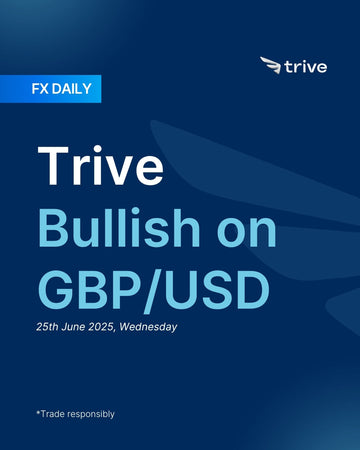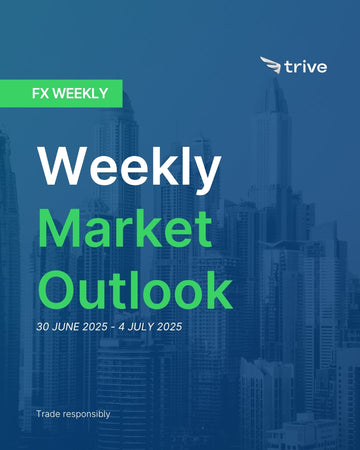FX Daily: Trive Bullish on GBP/CHF

The strong GBP underpinned by the UK’s political stability, limited exposure to tariffs and global trade tensions, robust macroeconomic data, and strong hedge-fund positioning. On the other hand, the CHF remain the best funding currency under the risk on sentiment given the persistent dovish SNB.
GBP: Still supported
The British Pound spent the week pulled between a major trade deal, a more dovish shift from the Bank of England, and surprisingly weak domestic data. However, its performance was ultimately shaped by the broader strength of the US Dollar. Sterling started off on a strong note, testing the 1.3600 level on optimism around a pending US UK trade agreement. The deal was officially signed on Tuesday and provided some initial support. But as the week went on, sentiment turned. On Thursday, the Bank of England delivered a dovish surprise when Deputy Governor Dave Ramsden joined two others in voting for an immediate rate cut. That was followed by a dismal May retail sales report on Friday, which pointed to deep weakness in consumer spending. Despite these negative domestic developments, the Pound didn’t collapse. Instead, it gradually lost ground, dragged down by the global shift into the US Dollar as a safe haven during the heightening Middle East tensions. GBP/USD fell through 1.3500 and closed near its weekly lows, with the Pound’s direction largely determined by external risk sentiment rather than UK specific news.
Economic data played a key role in the narrative. Friday’s retail sales report was the most striking, with sales plunging by 2.7 percent month over month, far worse than the expected 0.5 percent. The decline was broad based, signaling notable weakness in consumer demand. Yet the initial selloff in Sterling was surprisingly short lived. Earlier in the week, May’s inflation data came in mostly in line with expectations. Headline CPI held steady at 3.4 percent year over year, while core inflation eased slightly to 3.5 percent. The services inflation figure, a key input for the Bank of England, came in just below expectations at 4.7 percent, subtly backing the case for the more dovish voices within the bank. Additionally, the UK’s public borrowing numbers showed rising fiscal stress, with May’s public sector net borrowing figure marking the highest ever for the month outside of the pandemic years.
From a policy perspective, the Bank of England kept rates unchanged at 4.25 percent, as expected. However, the surprise came in the vote split. It was 6 to 3, with Dave Ramsden unexpectedly siding with Dhingra and Taylor in calling for a 25 basis point cut. This added to the sense that the BoE is shifting more clearly toward easing. Despite that shift, the Monetary Policy Committee kept its “gradual and careful” guidance, and Governor Bailey emphasized that this shouldn’t be interpreted as a commitment to cut rates in August. Still, the market reaction was muted, which showed that traders were paying more attention to the broader global backdrop than to internal Bank of England dynamics.
Last week’s main positive development for the Pound was the signing of the US UK trade agreement. The deal covers key sectors like beef, steel, autos, and ethanol. However, the announcement came with a notable caveat, the US will keep its 25 percent tariff on UK steel in place “for now,” which dampened some of the enthusiasm. Still, the agreement helped provide some support for the Pound and likely prevented a steeper decline.
In terms of market sentiment, the Pound’s movements reflected global risk flows rather than domestic factors. The strength of the US Dollar, driven by safe haven demand and a hawkish Federal Reserve, overwhelmed the Pound’s own story. The reaction to both the BoE’s dovish shift and the weak retail sales report was subdued, signaling that markets were more focused on the geopolitical risks and broader dollar dynamics. Instead of reacting sharply to UK specific events, the Pound drifted lower throughout the week, shaped by the dominant trend in global sentiment.
Our baseline bias remains bullish on the British pound, underpinned by the UK’s political stability, limited exposure to tariffs and global trade tensions, robust macroeconomic data, and strong hedge-fund positioning. However, the ongoing conflict between Iran and Israel may drive a preference for traditional safe havens such as the Swiss franc and Japanese yen; even so, sterling should hold up better than currencies like the Australian and New Zealand dollars.
CHF: Long term bearish
The Swiss Franc’s traditional role as a leading safe haven currency was seriously challenged this week and ultimately failed to hold up, as the Swiss National Bank’s clearly dovish stance took precedence over rising geopolitical tensions. The Franc began the week underperforming, even as concerns grew over the Middle East conflict. The main event was Thursday’s SNB policy meeting, where the central bank cut its key interest rate by 25 basis points to 0.00 percent, in line with expectations. Although the Franc briefly rallied after the announcement, largely due to relief that the cut wasn’t deeper at 50 basis points, the move didn’t last. The tone quickly shifted after Chairman Schlegel’s press conference, where he refused to rule out a return to negative rates and reiterated the bank’s willingness to intervene in foreign exchange markets. This clear commitment to a dovish policy direction, aimed at supporting growth and addressing disinflation, made the Franc an unattractive asset. As a result, even amid a broad flight to safety that lifted the US Dollar, the Swiss Franc was sold off. The growing interest rate gap between a dovish SNB and a hawkish Fed made the Franc one of the worst performers of the week.
Economic data supported the SNB’s cautious approach. Producer and import prices for May fell by 0.5 percent month over month, underscoring the continued disinflationary pressure in the pipeline. In addition, the State Secretariat for Economic Affairs revised down its GDP growth forecasts for both 2025 and 2026, highlighting concerns about the country’s economic momentum. These weaker fundamentals gave the SNB further justification to ease policy and maintain a dovish tone.
On the policy front, the SNB’s 25 basis point rate cut brought the key policy rate to zero. While the decision was fully expected, the focus quickly shifted to the central bank’s messaging. Chairman Schlegel’s comments signaled that the SNB remained firmly in easing mode, stressing that a return to negative interest rates could not be ruled out and that the bank was still prepared to intervene in currency markets if necessary. This outlook reinforced the idea that the SNB would maintain one of the most accommodative stances among major central banks. The initial post meeting rally in the Franc was short lived, as it became clear that the SNB remained committed to supporting the economy through dovish measures, even in the face of geopolitical risk.
Market sentiment highlighted the Franc’s failure to attract safe haven flows. Despite a sharp uptick in global risk aversion, particularly due to fears of a broader conflict in the Middle East, investors favored the US Dollar as the haven of choice. The SNB’s ultra dovish stance, combined with the widening rate differential against the US, made the Franc costly to hold. This dynamic dominated the market’s view, pushing the CHF lower not only against the Dollar but also relative to most other G10 currencies. Instead of benefitting from geopolitical uncertainty, the Franc suffered as monetary policy took center stage.
The Swiss National Bank cut rates to 0.00% but avoided sounding overly dovish, which supported the currency. Markets also pulled back expectations for deeper cuts, and the SNB kept a neutral stance on currency intervention. While global risk sentiment could influence CHF in the near term, especially over the summer, its long-term use as a funding currency remains intact. We expect EUR/CHF to gradually rise and reach around 0.97 by year-end.
Risk sentiment will remain an important driver of the currency, strong risk-on may weaken it, while strong risk-off could provide a boost.

Disclaimer
This material is provided for informational purposes only and does not constitute financial, investment, or other advice. The opinions expressed in this material are those of the author and do not necessarily reflect the views of Trive International. No opinion contained in this material constitutes a recommendation by Trive International or its author regarding any particular investment, transaction, or investment strategy. This material should not be relied upon in making any investment decision.
The information provided does not consider the individual investment objectives, financial situation, or needs of any specific investor. Investors should seek independent financial advice tailored to their individual circumstances before making any investment decisions. Trive International shall not be liable for any loss, damage, or injury arising directly or indirectly from the use of this information or from any action or decision taken as a result of using this material.
Trive International may or may not have a financial interest in the companies or securities mentioned. The value of investments may fluctuate, and investors may not get back the amount they originally invested. Past performance is not indicative of future results.
For more information about Trive International, please visit http://trive.com/int
Additional Information
Investing involves risk, including the potential loss of principal. Diversification and asset allocation strategies do not ensure a profit or guarantee against loss. The content in this material is subject to change without notice and may become outdated or inaccurate over time. Trive International does not undertake any obligation to update the information in this material.
By accessing this material, you acknowledge and agree to the terms of this disclaimer. If you do not agree with these terms, please refrain from using this information.
暂无评论
主页
特里夫
TriveHub





0条评论